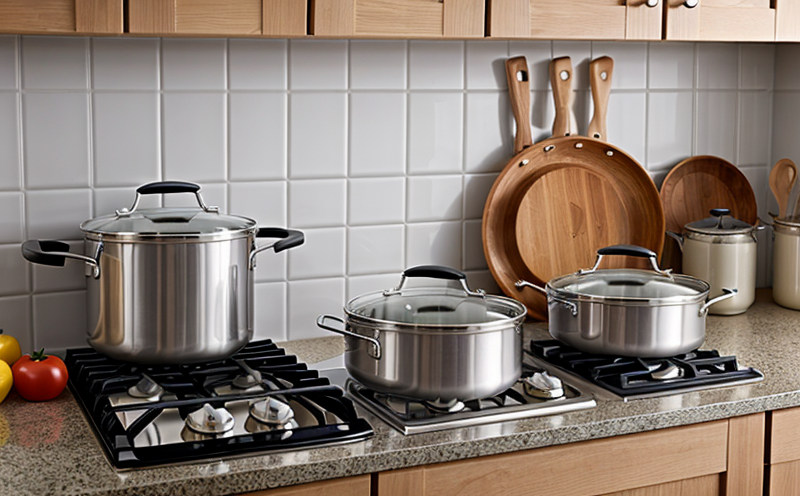Water Absorption Testing of Porous Kitchenware
The testing of water absorption in porous kitchenware is a critical step to ensure that products meet safety and quality standards. This service ensures that materials used in the manufacture of kitchenware like cutting boards, sponges, and other absorbent items are safe for consumer use. The primary concern with porous materials in kitchenware is their potential to harbor bacteria due to moisture retention.
Water absorption testing involves measuring how much water a material can hold when immersed under specified conditions. This test helps determine the suitability of the material by assessing its ability to retain or absorb liquids, which directly impacts hygiene and durability. The procedure typically follows international standards such as ASTM D570-18 for porous materials.
The testing process begins with selecting a representative sample from the batch of kitchenware. Each sample should be free from defects that could affect water absorption rates. After cutting to standardized dimensions, each piece is weighed accurately before being immersed in deionized water at 23°C ± 1°C for a specified period (usually 1 hour). Post-immersion, the samples are dried according to standard methods until they reach equilibrium moisture content.
The degree of water absorption is calculated based on the difference between the initial and final weights of each sample. A lower percentage indicates better material performance in terms of retaining hygiene standards while maintaining functionality. This service also helps manufacturers identify potential issues early, ensuring compliance with regulations like EU MDR (Medical Device Regulation).
Understanding the implications of water absorption is vital not only for kitchenware but also for other porous materials used in industries such as textiles and building construction where moisture management plays a key role.
| Sample Preparation | Immersion Conditions | Drying Method | Water Absorption Calculation |
|---|---|---|---|
| Cut to Standard Dimensions | 23°C ± 1°C, Deionized Water for 1 Hour | To Equilibrium Moisture Content | Difference Between Initial and Final Weights |
The results from water absorption testing are crucial for ensuring that kitchenware meets stringent hygiene standards. By adhering to these tests, manufacturers can prevent bacterial growth and ensure the longevity of their products.
Eurolab Advantages
EuroLab offers unparalleled expertise in water absorption testing of porous kitchenware. Our team consists of highly qualified professionals with extensive experience in materials science and product safety assessment. We pride ourselves on our commitment to accuracy, reliability, and speed.
Our state-of-the-art laboratory facilities are equipped with the latest equipment, ensuring consistent and precise results every time. With a reputation for excellence, we have served numerous clients across various industries, providing them with reliable data that supports their compliance efforts.
We understand the importance of timely delivery of reports and strive to meet deadlines without compromising quality. Our flexible approach allows us to accommodate diverse client needs, offering customized testing packages tailored specifically to individual requirements.
International Acceptance and Recognition
The water absorption test for porous kitchenware is widely recognized by international bodies such as the International Organization for Standardization (ISO) and ASTM International. These standards provide a consistent framework that ensures accuracy and repeatability across different laboratories.
Countries like the European Union, United States, Canada, and Australia have adopted these guidelines to regulate product safety and quality. By conducting tests according to these recognized standards, manufacturers can ensure their products meet global market requirements.
Use Cases and Application Examples
| Product Type | Purpose of Testing | Testing Methodology |
|---|---|---|
| Cutting Boards | Evaluate Durability & Hygiene | ASTM D570-18 Standard Method |
| Sponges | Assess Bacteria Retention Potential | ISO 28346-2019 |
| Foam Utensils | Determine Suitability for Food Contact | ASTM D570-18 Standard Method |
In addition to these examples, we also provide testing services for other porous kitchenware items such as strainers and scrub brushes. Each type of product requires specific attention to detail during the testing process to ensure accurate results.





